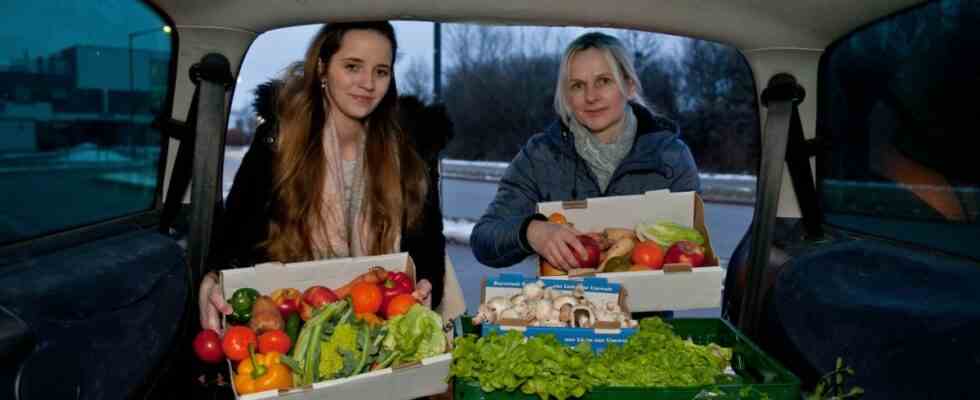The sell-by date of your favorite yoghurt that you happily bought a week ago has passed. The banana is brown and the quark has been open in the fridge for too long. Often it all ends up in the garbage, for reasons that the food rescuers from the Ebersberg district cannot understand. It has existed since 2021, a sub-group of the international organization food sharingwhich has been committed to minimizing food waste since 2012 by saving food from the bin and redistributing it.
Yvonne Rowold is one of them. She has been a member of the Foodsharing Network since 2016. An acquaintance introduced her to the idea at the time, and so in 2021 she became a founding member of the Foodsharing association in the Ebersberg district. She says: “It’s much easier to act in a club than as an individual food sharer in the Ebersberg district.” Organized in the association, the Foodsavers are now also insured and have completely different opportunities to become public. They were also able to start working with the district office and the district youth council.
The club has since grown from 43 members to 206. However, they are not only working on keeping expired but still edible food out of the bin and instead making it publicly accessible on shelves and refrigerators, so-called “fair dividers”. But they also do educational work. Again and again, the food sharers try to get into conversations with people via information stands. “People are often skeptical at first and have hygiene concerns,” reports Yvonne Rowold. You first have to explain to them that the groceries are of course not saved from the garbage can, but are received directly from the cold store through cooperation with the markets. Hygienic standards are always adhered to and the cold chains are not interrupted. Since January 2023, Foodsavers have also had to complete hygiene training.
“However, people often ask whether there is still enough available for the board,” continues Rowold. It is important to her to make it clear that when it comes to food sharing, the focus is not on caring for the needy, as is the case with the Tafel, but on recycling food that would otherwise be thrown away. “We always give priority to the table and are practically the last bastion before the bin.” The saved food can go to the needy, but is also passed on to the public in food baskets. “These are really for anyone who has set themselves the goal of helping to ensure that food that is easy to digest can still be used for a useful purpose.” For example, bananas have sometimes gone to a horse farm, and other foods have benefited an animal shelter.
Rescue operations take place every day in the Ebersberg district
31 companies cooperate with the food sharers from Ebersberg, including bakeries, supermarkets and companies. But even a school canteen and a day care center would occasionally ask whether they would be interested in picking up the leftover lunch, which would otherwise end up in the garbage can. Thanks to the daily availability of the Foodsaver – from Monday to Sunday – a total of 204,950 kilograms of food have been saved in 7,896 food-saving campaigns over the past two years.
In order to minimize food waste in private households, too, Rowold has a few tips ready. First of all, you should not be put off by the best-before date when you look in the fridge in the supermarket or at home. After all, it is not without reason that there is a difference between the best-before date and the use-by date. “The use-by date must be observed and adhered to at all costs,” explains Rowold. This can be found, for example, in raw meat such as minced meat or smoked fish. The best-before date, on the other hand, is a rough guideline, the markets have to sort out the “expired” food, but that doesn’t mean it’s bad. Here it is advisable to trust your own senses in order to test the product’s durability by seeing, smelling and tasting.
Before going on vacation, you can find out about distribution points and fair dividers in the vicinity and bring your groceries from the fridge there. “Sometimes it makes sense to network privately,” Rowold continues. Anyone who cannot manage to pick or use the apples from the apple tree in their own garden can invite others to do so.
Food sharing is not only good for the environment, it also saves money
To illustrate how important and valuable food sharing has become for her, Rowold talks about her neighbor, who she occasionally puts a basket with a colorful mix of rescued food in front of her door. At Christmas she thanked them with a card and wrote that she would have to shop less and have more time for her children and could even donate some money. “That was very valuable for me, because collecting, packaging and distributing the groceries is work,” explains Rowold, who works full-time for an IT consulting company in internal sales and is still a volunteer on the extended board as a food saver.
“I would like people to appreciate our food more overall, including the work and production behind it,” says Rowold in conclusion. It would be great if you could show more openness to seasonal and regional products and not ask the markets to always have everything in stock.

